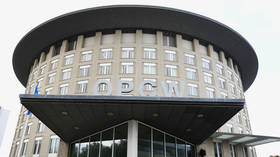Dissenting paper on Douma attack exposes ‘compromised reporting & analysis’ by OPCW – MIT professor

The OPCW failed to include evidence on the Douma “chemical attack” that contradicts the West’s favored narrative in its final report, so the resulting document is inherently compromised, an MIT professor said.
The chemical weapons watchdog released its conclusions on last year’s high-profile incident in early March. The Organisation for the Prohibition of Chemical Weapons (OPCW) claimed that chlorine-filled gas cylinders were dropped from the sky on the Damascus suburb. It did not directly pin the blame on the Syrian government, however.
Last month, there was a leak of an internal technical assessment which had been produced by a member of the OPCW fact-finding mission that studied two locations where the cylinders were found.
Also on rt.com Leaked OPCW memo casts doubt on watchdog’s Douma ‘chemical attack’ conclusionsThe document stated that the evidence the inspectors found didn’t square with the idea that the cylinders fell from the sky, and that the logical explanation was that they had been planted there. This opinion was ignored in the watchdog’s final document, and this makes it “a product of compromised reporting of the inspection and analysis process by upper level OPCW management,” Theodore Postol, a leading expert in missile technology, told the Grayzone Project.
The scalding criticism came in response to the way the head of the OPCW addressed the embarrassing leak. Director General Fernando Arias said the opinion had no place in the final report because it “pointed at possible attribution” in the incident, which was contrary to the mandate given to the mission.
He said the data was instead studied by three external experts, who “all reached the same conclusions that can be found in the FFM final report.”
Postol disagreed and accused Arias of mischaracterizing what was said in the leaked paper. The document “provided unambiguous contradictory data… that explicitly showed that the attacks were instead staged,” but didn’t go as far as pinning it on anyone.
The Douma incident sparked global outrage, partially thanks to footage of children being doused with water in a makeshift hospital, which was circulated by the media worldwide. The scene was later revealed to have been staged and not related to the alleged chemical attack.
Also on rt.com ‘Where are the headlines?’ Roger Waters points to Syria gas attack ‘stench’ in wake of leaked reportThe US, UK, and France retaliated against Syria, firing a barrage of missiles at what they called sites related to Syria’s chemical weapons program.
The dramatic events happened just as the Syrian Army backed by Russian warplanes was about to capture the neighborhood from a radical Islamist group controlling it. As the situation unfolded, some Western journalists also started to question the official narrative, saying the incident may have been staged to frame Damascus.
Subscribe to RT newsletter to get stories the mainstream media won’t tell you.













